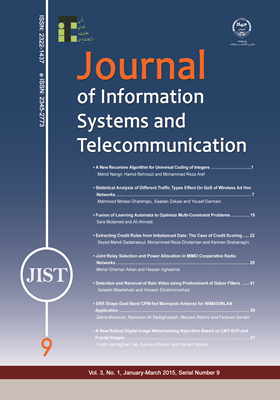Statistical Analysis of Different Traffic Types Effect on QoS of Wireless Ad Hoc Networks
محورهای موضوعی : Wireless NetworkMahmood Mollaei Gharehajlu 1 , Saadan Zokaei 2 , Yousef Darmani 3
1 - K. N. Toosi
2 - K. N. Toosi
3 - K. N. Toosi University of Technology
کلید واژه: Effective Bandwidth, Effective Capacity, Performance, CBR, Poisson, Markov Modulated Poisson Process,
چکیده مقاله :
IEEE 802.11 based wireless ad hoc networks are highly appealing owing to their needless of infrastructures, ease and quick deployment and high availability. Vast variety of applications such as voice and video transmission over these types of networks need different network performances. In order to support quality of service for these applications, characterizing both packets arrival and available resources are essential. To address these issues we use Effective Bandwidth/Effective Capacity theory which expresses packet arrival and service model statistically. Effective Bandwidth asymptotically represents arrival traffic specifications using a single function. Also, Effective Capacity statistically describes service model of each node. Based on this theory, at first we modeled each node’s service as an ON/OFF process. Then a new closed form of Effective Capacity is proposed which is a simple function and is dependent on a few parameters of the network. Afterward the performance of different traffic patterns such as constant bit rate, Poisson and Markov Modulated Poisson process are statistically evaluated in the case of both single and aggregate traffic modes. Using the proposed model we will show that traffic pattern affects QoS parameters even if all models have the same average packet arrival rate. We prove the accuracy of our model by a series of simulations which are run using NS2 simulator.
IEEE 802.11 based wireless ad hoc networks are highly appealing owing to their needless of infrastructures, ease and quick deployment and high availability. Vast variety of applications such as voice and video transmission over these types of networks need different network performances. In order to support quality of service for these applications, characterizing both packets arrival and available resources are essential. To address these issues we use Effective Bandwidth/Effective Capacity theory which expresses packet arrival and service model statistically. Effective Bandwidth asymptotically represents arrival traffic specifications using a single function. Also, Effective Capacity statistically describes service model of each node. Based on this theory, at first we modeled each node’s service as an ON/OFF process. Then a new closed form of Effective Capacity is proposed which is a simple function and is dependent on a few parameters of the network. Afterward the performance of different traffic patterns such as constant bit rate, Poisson and Markov Modulated Poisson process are statistically evaluated in the case of both single and aggregate traffic modes. Using the proposed model we will show that traffic pattern affects QoS parameters even if all models have the same average packet arrival rate. We prove the accuracy of our model by a series of simulations which are run using NS2 simulator.


